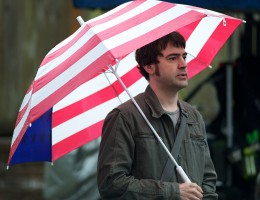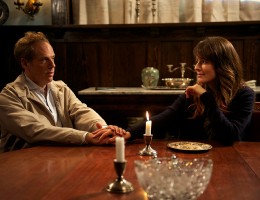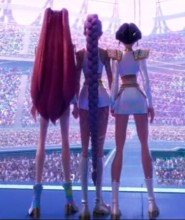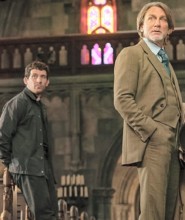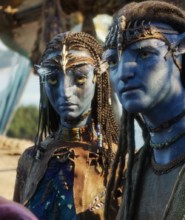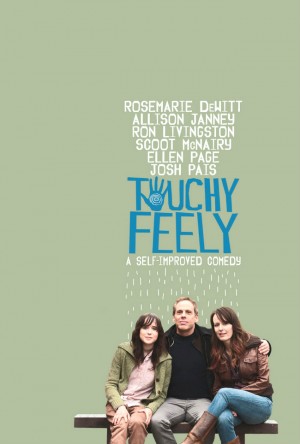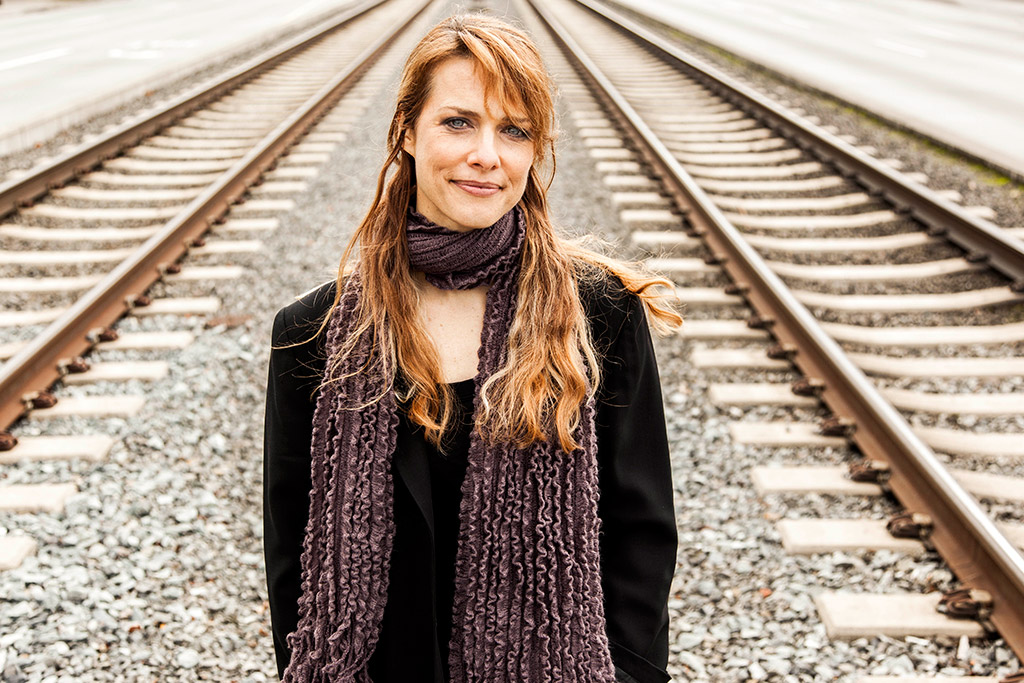
“Touchy Feely” – Interview with Lynn Shelton
by Sara Michelle Fetters - December 11th, 2013 - Interviews
Embracing Vulnerability
Lynn Shelton Finds Strength in Being Uncomfortable
If you blinked this past September, you might have missed Seattle native writer/director Lynn Shelton’s latest drama-comedy hybrid Touchy Feely playing in theatres. If so, then you didn’t get to experience its odd, idiosyncratic emotional delights, the film a dexterous character study about a popular massage therapist named Abby (Rosemarie DeWitt) who finds herself unable to touch the human body while at the same time her staid, withdrawn older brother and dentist Paul (Josh Pais) is gifted, maybe cursed, with hands that miraculously cure any ailment they come in contact with.
Following its own path, the movie doesn’t push and doesn’t prod, allowing it’s emotional nuances to come to life with subtle precision without any sort of melodramatically drippy excess while also showcasing a pair of strong performances from DeWitt and Pais ranking as two of their best. While there are certainly speed bumps along the way, and while not all facets connect as cleanly as they have in Shelton’s previous two efforts Humpday and Your Sister’s Sister, the movie is still a marvelously entertaining delight, and as such I can’t help but hope people take the time to seek it out and give it the attention I think it deserves.
Out on Blu-ray and DVD this coming Tuesday, I recently had the opportunity to speak with Shelton via phone about the film, it’s making and what seeing it come to life has meant to her. It was the third time she and I have been able to touch base, and like all of our previous conversations this one was as joyous, and as informative, a chat as any I’ve had the pleasure to have. Here are some of the highlights:
Sara Michelle Fetters: So, you have to tell me, where do you come up with the idea of a massage therapist who suddenly develops a phobia in regards to touching people? Where does something like that come from?
Lynn Shelton: It came from years of getting massages before ever actually thinking about what the experience of giving massages must be like to a total stranger, naked, laying on a table, and I think I went to see somebody in a different city and I saw the last client getting into a cab as I was coming out and I just became aware that being a massage client I was just one in a long line of them. Just a stream of naked bodies passing through this person’s table. I thought how intense that would be. What a weird occupation.
So, for me, while it’s a great job and a fantastic skill, it’s just not something I could do. Bodies are weird. Skin is freaky. I just wondered if people who worked like this with the body ever reached a point they couldn’t handle people, where they just couldn’t touch another one, even for a day, and that germ of an idea had bouncing around in my head for a number of years. When I was working with Rosemarie on Your Sister’s Sister that character started bubbling up to the surface for me again and I realized that this person was [her]. I was suddenly able to write and finish the script once I had Rosemarie in mind.
Sara Michelle Fetters: I remember reading in an interview that Rosemarie gave that the time you told her about the story to the time she had the script in her hands was extremely quick, something like a handful of months. Is this true?
Lynn Shelton: Not really. About a year before we shot [the film] I told her I’d been playing around with this idea, which was really vague at the time, and I just wanted to feel her out, wanted to see if it was an idea she might be potentially interested in. She immediately said yes. Anything I wanted to do she said she’d be involved with, she was incredibly generous.
I went off and, at the time, it looked like I would be shooting another film so I wouldn’t be able to work on the script right away. I put off Touchy Feely in sort of a half-baked state, it wasn’t ready. I knew this other film was going to begin and it was going to take all of my energy. But then, it kept pushing [being delayed], we were ready to shoot it than we had to wait, and then we were going to shoot it two months later but then we had to wait, and then two months later we were going to shoot it again when suddenly we had to wait. When this happened for the fifth time I just said I couldn’t wait anymore, I have to get on a set. I called Rosemarie up and asked her if she’d be available in two-and-a-half, three months’ time, because if she wasn’t available than I wasn’t going to waste the time finishing the script.
I asked this of both her and Josh Pais, by the way, because I wrote that character for him as well; those two characters couldn’t have been played by anyone else at least as far as my mind was concerned. When they said they were available, I went into my writer’s room and got to work. We were shooting two months later. So, I guess, when I actually asked Rosemarie when she was going to available to when we started filming that was rather quick, but the script itself did take a fair bit of time. It was kind of crazy that way.
Sara Michelle Fetters: The relationship you seem to have with both Rosemarie and Josh in regards to this film, there feels like there is so much give and take between the actors, the script and what it is you’re all trying to accomplish. It’s almost as if they slipped right in and you forget they’re such instantly recognizable faces.
Lynn Shelton: Isn’t that awesome? In regards to Josh, he and I had been talking for a number of years and had gone back and forth trying to get a handle on this character. He [Paul] was originally supposed to be in a different film, with this character, but I realized when I started writing Touchy Feely there was this massage therapist who suddenly loses her mojo that his arc, a dentist who suddenly discovers his touch is healing, would make for an interesting juxtaposition. It was fun to craft two siblings who were such polar opposites; that there was this gentle friction between them. I thought how interesting it would be to see them suddenly switch places.
On set, even before that, when I had the whole thing cast I’d get on the phone with them a lot. I’d call up Josh and Ellen Page and talk about their relationship, find out what happened to her mother, talk about what their collective past was like. Then I’d get all three of them on the phone and we’d talk about their dynamic as a family, how they would function. So, by the time we got to set everybody really knew who their characters were, what it was that had happened to them in their lives, what was involved with the relationships they had in the past. They were also all comfortable with each other; there was trust between them all. I think all of this helped as far as shooting was concerned immensely.
Sara Michelle Fetters: I don’t think I’ve enjoyed Josh in any previous performance as much as I did this one here. He truly is a joy to watch.
Lynn Shelton: He’s so great. The physicality of his work, especially as it concerns this character of Paul, is just incredible. He’s so inward. It’s like his ribcage is dropped downwards, as if he’s two inches shorter than he actually is. It’s like his toes are curled up so he can’t actually walk properly. He’s just so rooted in that character physically that I had friends watch the film and ask me if he’s really like that in real life. I’m like, no! He’s the opposite! He’s tall, confident, emotionally open, a true gentleman. You’d just never, ever know that if all you saw was the movie. How he found this guy, discovered Paul, both physically and emotionally, it’s amazing. He’s amazing.
Sara Michelle Fetters: Does the success of your last couple films, Humpday and Your Sister’s Sister, both with critics and with the audiences that found them, lead you to find that it gives you a certain caché with actors? Is it easier for you to go out and approach people like Josh Pais, like Ellen Page, and find that they’re more inclined to look at your script and walk through that door with you?
Lynn Shelton: I think less critical and financial success but more just showing them the work itself has helped as far as that has been concerned. The work itself does the talking for me. I think they see my work and that helps, and they hear how I work, that I’m genuinely open to their ideas and want to create a collaborative atmosphere. What actor wouldn’t want to work that way? We really try to create a dream experience for the actor, that’s my shtick, that’s my deal. I really love actors. I’m an actor-geek as a director. That’s just the way it is. That’s what I’m all about.
Sara Michelle Fetters: Getting back to Rosemarie, you two seem to have a chemistry, an unforced, entirely honest symmetry that’s incredible. What is it about her, about the two of you working together, that just seems to bring the very best out of Rosemarie as an actress?
Lynn Shelton: That is just splendid to hear. Thank you so much. I feel like there is definitely a kinship, that we definitely appreciate each other a lot. I feel like her processes mesh well with what I want to do. Rosemarie is somebody who is incredibly engaged, incredibly intelligent as an actor. She really loves film. She reminds me of an actor who is also a dramaturge because she really wants to understand the text and the structure and the art of the story, it’s important to her. It’s something that’s very intellectual but also very instinctual, which is part of what I think makes her such an amazing actress.
But even if she doesn’t completely understand what it is you’re trying to do, even if it doesn’t all make sense right at that moment, she’s willing to come to me and say, ‘I trust you,’ and then dive right in and let it all go. She’s so comfortable in the work and the process that this is oftentimes when the best work happens, she’s willing to just go there and let it fly.
She’s so brilliant, as well as very complicated and layered human being, and I think that’s one of the reasons her performances as far as I’m concerned are so compelling. She brings all of those layers and depth time and time again. I mean, look at her work in Promised Land? I don’t think there’s maybe much on the page. I don’t think there’s a lot that’s expected from that character. And yet Rosemarie is so dialed in, so compelling, she’s totally mesmerizing, helping give the film additional layers it might otherwise not have had. It’s what she does in every film. I like to believe I help bring something out of her, but it’s all Rosemarie, it’s all in her. She’s incredible.
Sara Michelle Fetters: At the end of the day, what do you want people to take away from Touchy Feely? What do you hope they’re talking about when it comes to an end?
Lynn Shelton: This is a very quiet film. There is a lot of meditative breathing room but there’s a lot of emotion as well. I felt really vulnerable making it. It was very difficult, and it finally occurred to me that the reason of this was that it deals with a really emotional state and I was terrified I was making some kind of overly sentimental treacle. I was really terrified of that. I had all of my feelers out trying to make sure that didn’t happen. I wanted to make a film that allows you to come to it instead of forcing itself upon you in an over-emotional kind of way.
But, because of the territory it is exploring, people who are really lost and trying to find themselves in uncharted territories, I find that people find something of themselves within it. As viewers, I’m fascinated how different people are affected by different parts of the film. There are a lot of tears, but they happen at different points for every person, and I think that’s because everyone is laid open a little bit, that they bring themselves into the experience of watching it. And, I guess that’s what I hope people continue to do. I want them to be open to the experience, to let the film wash over them and that they can come out afterwards feeling something.
– Interview reprinted courtesy of the SGN in Seattle

